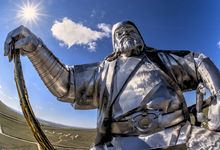A sceptic as an example
He was a doubter, a man who seemed to fail because he did not endure to the end. At times history depicts him as an antihero—and yet there were so many things he did manage to get right.

Six months before the birth of Jesus, a boy was born. His parents were considered old and sterile, and yet they became a mother and father: Elizabeth and her husband Zacharias, a priest of the division of Abijah. They called their son John (Luke 1). It was in the mountain city of Ein Keram, seven kilometres west of Jerusalem—so Bible scholars today conclude—that the way-preparer of Jesus was born.
Turning his own life upside down
John grew up in the mountain region, lived a simple life for many years in the wilderness, where he lived on locusts and wild honey, and clothed himself with garments of camel hair girt with a leather belt—the attire of the penitent and the poor. He was an ascetic, of whose childhood and youth not much is known.
At the age of about 27 he followed his calling and announced the coming of the Messiah to his contemporaries in no uncertain terms (Luke 3). He called for repentance and conversion, baptised people with water, and in so doing joined the ranks of other itinerant preachers in the region. People could not help notice the dramatic speeches of John the Baptist over the years. He not only emphasised baptism with water, but also went on to make reference to the coming baptism with the Holy Spirit (Matthew 3: 11).
Giving precedence to Jesus
In the process he managed not to become an idol in his own right, but rather referred consistently to Jesus Christ: “He [Jesus] must increase, but I must decrease” (John 3: 28–30). And he rejoiced whenever people accepted Jesus.
Undeterred by the conditions around him, John wandered through the desert, made his way preaching upward along the Jordan in Aenon, and then continued east of the Jordan. It was there that he met the 30-year-old Jesus among the people waiting to be baptised. After initially refusing, he ultimately also baptised the Son of God.
In all of this he was not at all concerned with external matters or interested in pursuing his own advantage. And the general conditions of his life appeared more than disadvantageous: first of all, there was the isolation of the desert to contend with, along with the general lack of funds, the poor conditions, and finally even discussions among his own disciples who feared that Jesus would entice other disciples away. John created calm and smoothed over the apparent inconsistencies.
Taking the stand as an eloquent witness
John’s words and actions were so outstanding that people from Jerusalem and all over the country went out to meet him at the Jordan. So convincing was his testimony that more and more people were baptised (Matthew 3: 5). He won over many people—all for Jesus.
In his testimony, John made his point over and over again: Jesus Christ is the Redeemer who leads human beings into fellowship with God (John 1: 29, 36). Sin prevents such closeness with God and must therefore be eliminated. In his testimony he focused on the essentials of the good news, and never painted Jesus as a mere preacher of good morals or a faith healer.
Inquisitive beyond human understanding
First and foremost, John the Baptist preached judgement, not grace through Jesus Christ (Luke 7: 19–23). He did not understand all the interconnections, and did not know how to process the gospel as a whole. Some things appear to have been unclear to him, and ultimately, doubts arose within him which he was never able to fully resolve.
But he did consistently stand up for the observance of God’s commandments—and did not mince his words when doing so. When he denounced adultery of Herod Antipas in his second marriage, he was captured at the fortress of Machaerus on the Dead Sea, and ultimately executed at the request of Herod’s stepdaughter.
What kind of child will this be?
After his birth, which occurred some 2,000 years ago, John the Baptist’s neighbours posed the question: “What kind of child will this be?” (Luke 1: 66). He became a man who would prepare the way for Jesus Christ as no one else had ever done before. He became a man who would turn his life upside-down for Jesus Christ, and who would enduringly inspire people with his testimony of Jesus Christ. Beyond that, he would become a man who still serves as an example for Christians living in the twenty-first century.
“He must increase, but I must decrease.” This Bible text from John 3: 30 served as the basis for the Bible study divine service in June 2021. This special divine service format was comprised of an intensive look at his history, his social context, and the question of what lessons his life hold for our personal daily lives. In addition to our gatherings on church holy days, Bible readings can also be heard in our Bible study services.
Photo: Wittaya - stock.adobe.com

















